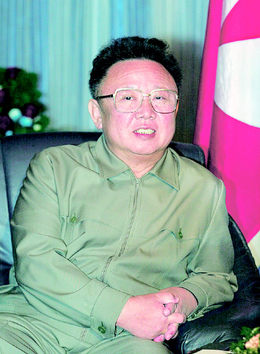 |
|
North Korea's leader Kim Jong-il
|
But tome never mentions ‘nuclear weapons’ or ‘sanctions’ by name
To bring in the New Year, North Korea published a joint editorial in three of its state-run newspapers, including Pyongyang’s mouthpiece, the Rodong Sinmun. This January 1 editorial is a change enacted after the death of Kim Il-sung in 1994, who would on the first day of the year normally outline the coming year’s policy direction through a New Year’s message. However, experts and officials at the unification ministry say the North’s New Year’s editorials are consistently obtuse, containing political slogans instead of specific proposals, making it difficult to predict North Korea’s policy direction. This year’s joint editorial was no exception. Two leitmotifs in this year’s message were ‘nuclear test’ and ’sanctions,’ but neither was mentioned directly. Instead, the editorial described last year as being "full of cheers" for the North’s military-first ideology, a phrase seen as describing the October 9 nuclear test. Later, the editorial becomes slightly more explicit, though never stating things outright: "The fact that we now have a nuclear deterrence was an event of celebration for our people, who strongly want to have a military undefeatable by anyone else." The editorial never specifically uses the phrase "nuclear weapons" - the North’s newly-tested technology is instead expressed only as "self-defensive military capability" or a "nuclear deterrence." North Korea’s top echelon of power besides leader Kim Jong-il is the National Defense Commission. The North’s relatively new military-first policy is seen by many as the backbone of Kim Jong-il’s regime. The phrase "military-first" first appeared in 1999’s New Year’s editorial, six months after the North launched a long-range missile over Japan. It appeared 41 times each in official statements released during all of 2005 and 2006. In this year’s editorial alone, coming in at about 14,000 words, the word appeared 36 times. According to the editorial, the nuclear test proved that the North’s military-first policy had revealed itself to be the correct path to take.However, North Korea has been under United Nations sanctions due to its nuclear test. Despite the resumption of the six-party talks in December after a 13-month stall, it remains unclear whether the U.N.-led sanctions will be lifted. The United States clarified that North Korea should first abandon its nuclear weapons in order for the sanctions to be lifted. Since September 2005, North Korea has also been under U.S.-led financial sanctions because of alleged financial wrongdoings at Macau-based Banco Delta Asia. In addition, inter-Korean food and fertilizer aid were suspended after the North test fired a salvo of missiles in early July, and the external business environment with the North is now seen as the worst it has been since the high point of the 2000 inter-Korean summit. While its economy has been a chronic problem for the North in recent decades, North Korea has no choice but to emphasize its continued fiscal blight. The word "economy" appeared 34 times in the latest editorial. The editorial urged North Koreans to put their utmost efforts into resolving the country’s economic problems. However, there was no new content as far as strategy toward resolving the economic problem. An official at the unification ministry said, "While there is no major difference between this and previous editorials, it’s notable that economic matters were referred to before military matters." Please direct questions or comments to [englishhani@hani.co.kr]





